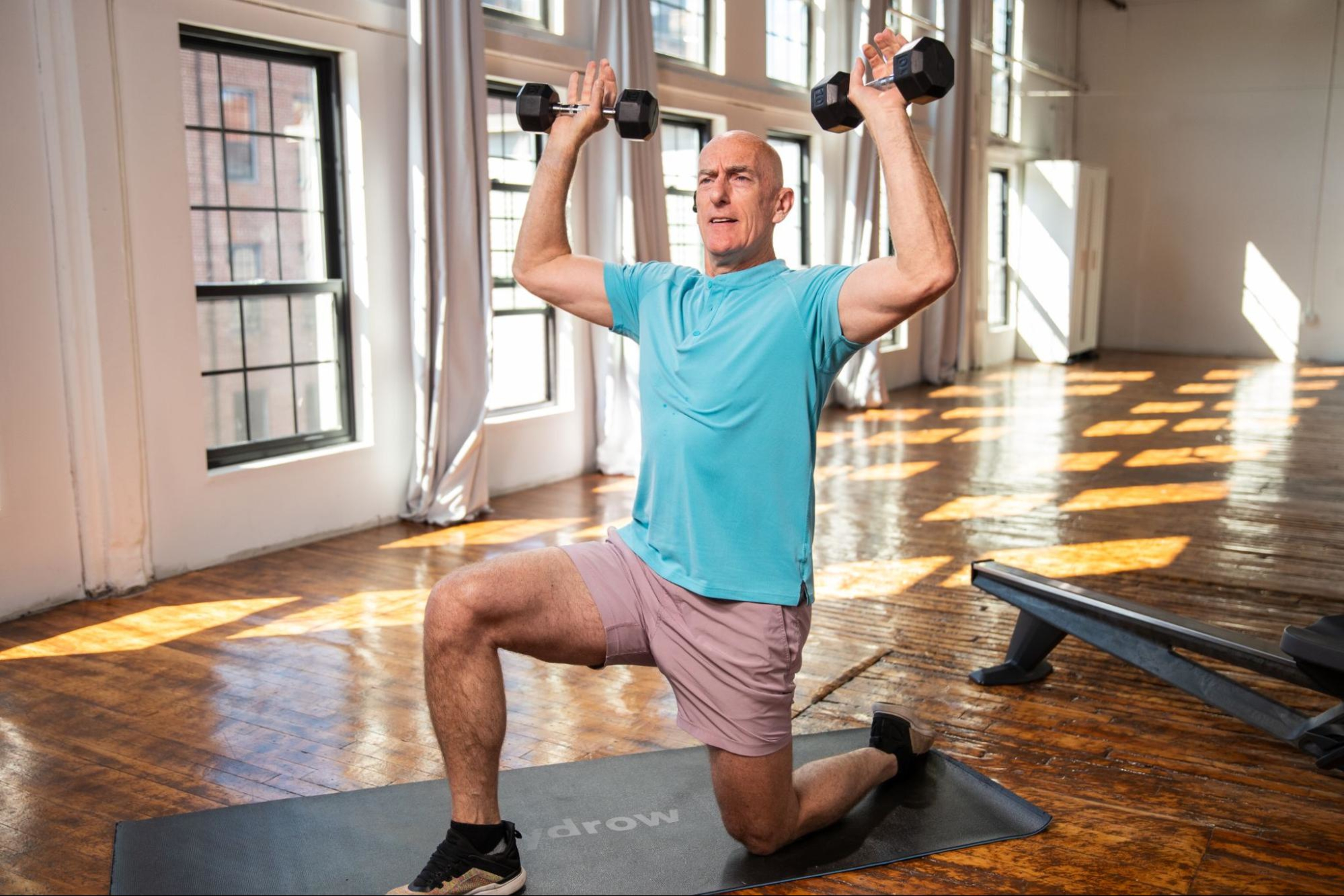Working Out Every Day: Key Benefits and How to Stay Safe

The idea of working out every day may be appealing, whether you’re aiming to reach specific fitness goals, boost your energy levels, improve your overall health, or simply maintain a routine. Exercising daily also has a ton of benefits, such as enhancing muscle strength, boosting mental health, lowering blood pressure, and aiding in weight loss when combined with proper nutrition.
However, it is important to consider the benefits and potential risks before you jump into a seven-day-a-week workout routine so you can strike the right balance of type and intensity of daily exercise to ensure safety, recovery, and sustainability. For those who thrive on consistency, working out daily can be a motivator and something to look forward to. However, there’s a fine line between exercising regularly and overtraining.
Let’s explore the pros and cons of working out every day and review some tips on how to do it safely, including:
Let’s get started!
The benefits of working out every day
Exercising consistently is one of the keys to holding yourself accountable to your fitness goals. It can be difficult to keep the momentum even after just one day off, especially for those new to exercise. Beyond a dependable routine, there are numerous other health benefits that working out every day can offer:
Improved cardiovascular health
Increased energy levels
Enhanced weight management
Strengthened muscles and bones
Improved mental health
Let’s take a look!
1. Improved cardiovascular health
One of the best benefits of daily exercise is improved cardiovascular health. Engaging in regular physical activity, such as 150 minutes of moderate aerobic exercise a week or high-intensity workouts for 75 minutes, helps reduce blood pressure and strengthens the heart. Consistent exercise boosts circulation and enhances your body’s ability to transport oxygen to your muscles, which can lead to better overall health.
2. Increased energy levels
Working out every day can lead to an increase in your overall energy levels. Regular exercise improves your body’s efficiency in using energy, making your daily tasks feel easier. It also releases endorphins, the “feel-good” hormones, which can help fight fatigue and improve your mood.
3. Enhanced weight management
Daily exercise is a powerful tool for weight management and fat loss. Whether through cardio or strength training, consistent movement burns calories and helps maintain a healthy weight. Combining regular exercise with a balanced diet can create a calorie deficit, a key to losing weight.

Did you know?
Over 90% of Hydrow members are still active one year later.
4. Strengthened muscles and bones
Frequent exercise promotes muscle strength and bone density. Resistance training, such as lifting weights or bodyweight exercises, can enhance muscle tone and endurance. Additionally, weight-bearing exercises can improve bone density, reducing the risk of osteoporosis as you age.
5. Improved mental health
Exercising every day has been shown to reduce symptoms of anxiety and depression. Physical activity increases serotonin and dopamine production, which are essential for maintaining a positive mood. It also serves as a natural stress reliever, providing a break from daily pressures and helping you feel more grounded.
The drawbacks of working out every day
Some of you have probably scrolled right to this section for a bit of confirmation bias. We see you! Working out every day can provide a host of benefits. That being said, recovery is just as important as exercise, and not setting aside adequate time for rest can inevitably negate your fitness progress through overtraining, injury, or fatigue.
Consider replacing a “rest day” with an active recovery day to maintain consistency while simultaneously allowing your body to heal. Still, look out for the following risks with exercising seven days a week:
Increased risk of overtraining
Potential for injury
Mental fatigue and burnout
Diminished performance
1. Increased risk of overtraining
Unfortunately, one of the biggest risks in working out seven times a week is overtraining. When you don’t allow your body enough time to rest and recover, you may experience fatigue, excessive muscle soreness, and even injury. Overtraining can also lead to burnout, making it difficult to stay motivated and actually enjoy exercise.
2. Potential for injury
Engaging in intense exercise every single day can increase the likelihood of injury. Muscles and joints are more susceptible to strains, sprains, and overuse injuries without adequate recovery. The risk of injury is even higher for those participating in high-impact activities like running or heavy weightlifting.
3. Mental fatigue and burnout
Exercising every day can also take a toll on your mental health. While daily exercise boosts your mood, it can also lead to feelings of obligation and pressure, especially if you’re not listening to your body. It’s important to hear what your body needs and build in time for rest and recovery to protect your fitness gains and overall health.
4. Diminished performance
Too much exercise without proper rest can negatively impact your performance. You may find that you’re unable to lift as much weight, run as fast, or complete your workouts with the same intensity. Pushing your body too hard without allowing it to recover can hinder progress and make your workouts less effective, ultimately slowing your gains.
Deciding to work out every day: Factors to consider
So you’ve made it this far, and you still want to exercise every day. Proud of you! Nevertheless, there are some factors to consider when choosing this path.
Before committing to daily exercise, think about your fitness goals. Are you trying to lose weight, build muscle, or improve your cardiovascular health? Working out every day may or may not be necessary, depending on your goals. Moreover, your current fitness level is another crucial factor. If you’re new to exercise, it’s best to start slowly and gradually increase your workout frequency or work out daily and slowly increase the amount of time you exercise. Jumping into a daily routine too quickly could lead to injury or burnout.

Explore Hydrow’s library of 5,000+ rowing, circuit training, yoga, Pilates, and mobility workouts.
Fitness level aside, it’s also a good idea to consider the type of exercise you’ll be doing each day. High-intensity or high-impact activities require more recovery time, while low-intensity exercises like walking, yoga, rowing, or stretching can be done more regularly without straining your body. Nevertheless, be sure to prioritize your recovery days by focusing on low-intensity exercises to keep your blood flowing while allowing your body to rest.
How to stay safe when working out every day
Keeping your body safe should be your No. 1 priority when exercising. Injury or overtraining will only hinder you from reaching your fitness goals, so do consider the following tips when working out every day:
Listen to your body
Incorporate variety into your routine
Prioritize recovery and nutrition
Warm up and cool down properly
Get enough sleep
1. Listen to your body
One of the most important things you can do when working out every day is to listen to your body. If you’re feeling fatigued, sore, or run down, it may be a sign that you need a rest day. Ignoring these signals can lead to overtraining, injury, and burnout.
2. Incorporate variety into your routine
Mixing up your workouts can help prevent overuse injuries and keep you engaged while you exercise. Alternate between cardio, strength training, and active recovery days to allow different muscle groups to rest.
For example, try an intense HIIT rowing workout one day, then follow it up with a low-impact yoga class the next day. This variety can also help you stay motivated and dialed into your fitness routine.
3. Prioritize recovery and nutrition
Recovery doesn’t just happen during rest days—it also involves proper nutrition and hydration. Make sure you’re eating enough to fuel your workouts and support recovery, focusing on nutrient-dense foods that contain protein, healthy fats, and complex carbohydrates. Staying hydrated is also vital, especially if you’re exercising frequently.
4. Warm up and cool down properly
Always include a proper warm-up and cool-down in your workout routine. Warming up prepares your muscles for exercise, reducing the risk of injury, while cooling down helps bring your heart rate back to normal and aids in recovery. Stretching after your workout can also improve flexibility and reduce muscle stiffness.
5. Get enough sleep
Sleep plays a critical role in recovery and overall health. Aim for at least 7–9 hours of sleep per night to support your body’s recovery process. Poor sleep can lead to decreased performance, increased injury risk, and hindered progress toward your fitness goals.
You’re off to a great start!
Working out every day can offer numerous benefits, including improved cardiovascular health, increased energy levels, enhanced weight management, and boosted mental well-being. However, it’s essential to consider the potential drawbacks, such as overtraining, injury, and burnout. By finding a balanced and sustainable workout routine, incorporating variety, and prioritizing recovery, you can safely enjoy the benefits of daily exercise.
Looking into incorporate more exercise into your daily routine? Hydrow’s rowing machines combine smooth, natural movement with advanced coaching technology that helps you train smarter and stronger. Each stroke works 86% of your muscles, delivering a full-body workout that’s low-impact and efficient.
Beyond rowing, Hydrow offers an extensive library of off-the-rower classes—including strength, mobility, yoga, and more—to help you build balanced fitness that supports your everyday life.
Explore the benefits of Hydrow’s rowing machines and workouts today.

Real strength keeps moving
Learn how working out with Hydrow can help support a fuller, more active life.








